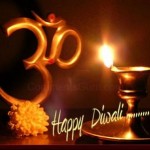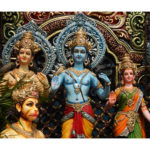Deepavali, The festival of lights is celebrated on Amavasya, the 15th day of the dark fortnight of the Hindu month of Ashwin. Each day of the 5 day festival has its own significance with a number of myths, stories and beliefs.
DHANTERAS
The first day is called “DHANTERAS” or “DHANTRAYODASHI” . The word Dhan means wealth. On this day Lakshmi Puja is performed in the evening when tiny diyas are lit, to drive away the shadows of evil spirits. A very interesting story about this day is of the 16 yr. Old son of King Hima. As per his horoscope he was to die of a snakebite on the 4th day of his marriage. On that day his young wife did not allow him to sleep. She laid all her ornaments and lots of gold and silver coins in a big heap at the entrance of her husband’s boudoir and lit innumerable lamps all over the place. And she went on telling stories and singing songs. When Yama, the God of Death, arrived there his eyes got blinded by the dazzle of the brilliant lights and he could’nt enter the Prince’s chamber. So he climbed on top of the heap of ornaments and coins and sat there the whole night listening to the melodious songs. In the morning, he quietly went away. Since then the day of Dhanteras came to be known as the day of “Yamadeepdaan” and lamps are kept lit through the night.
NARAK-CHATURDASHI
The second day known as NARAKACHATURDASHI, marks the defeat of the demon Naraka by Lord Krishna and his wife Satyabhama.
The “Puranas” have it that Naraka, son of Bhudevi, acquired immense power from blessings given by Lord Brahma after a severe penance. He soon unleashed a reign of terror in his kingdom. Naraka could not be easily killed as he had a boon that he would face death only at the hands of his mother Bhudevi. Krishna asks his wife Satyabhama, the reincarnation of Bhudevi, to be his charioteer in the battle with Naraka. When Krishna feigns unconciousness after being hit by an arrow of Naraka, Satyabhama takes the bow and aims at Naraka, killing him instantly. The slaying of Naraka by Satyabhama could also be taken to interpret that parents should not hesitate to punish their children when they stray onto the wrong path. The message of Naraka chaturdashi is that the good of society shoud always prevail over one’s own personal bonds.
Krishna , after his victory over Naraka came home early, on the morning of Narakachaturdashi day. The womenfolk massaged scented oil all over his body to wash away the filth. Since then the custom of taking bath of taking bath before sunrise with perfumed “uptan” on this day has become a traditional practice.
Amazon #ads

LAKSHMI PUJA
The third day of the festival of Diwali is the most important day of Lakshmi-Puja which is entirely devoted to the propitiation of Goddess Lakshmi. It is believed that on this day Goddess Lakshmi would be in her benevolent mood and fulfill the wishes of her devotees. So those who worship Goddess Lakshmi on this day would be bestowed with all the riches.
Also on this very day the Sun enters his second course and passes Libra which is represented by the balance or scale. Hence, this design of Libra is believed to have suggested the balancing of accounts books and their closing. For the business community, Diwali marks the worship of Goddess Lakshmi and also the beginning of the new financial year.
This day is also celebrated as the return of Lord Ram along with Sita & Lakshman, after 14 years of exile and his victory over Ravana. To celebrate his return to ayodhya, his subjects illuminated the kingdom with innumerable twinkling diyas and converted the amavasya night into a bright day.
PADWA
The fourth day is Padwa or Varshapratipada which marks the coronation of King Vikramaditya and Vikram- Sam vat was started from this Padwa day. It is also marked as the beginning of the Hindu New Year and as a brand new beginning for all. Govardhan Puja is also performed on this day as Lord Krishna saved his Gokul from Indra’s anger by lifting up the Govardhan Mountain with one finger.
Goddess Lakshmi is worshipped in every Hindu household and her blessings are sought for success and happiness. This day is looked upon as the most auspicious day to start any new venture.
BHAI – DHUJ
The fifth and final day of Diwali is known as “Bhaiyya-Dhuj” . As legend goes Yamraj, the God of Death visited his sister Yami on this day. She put the auspicious tilak on his forehead, garlanded him and fed him with special dishes and both of them ate the sweets, talked and enjoyed. As a parting gift, Yama gave her a special gift. In return Yami also gave him a lovely gift which she had made with her own hands. That day, Yama announced that anyone who receives a tilak from his sister will always prosper. Since then this day is also known by the name “Yama-Dwitiya” and is observed as symbol of love between brothers and sisters.
Thus Diwali projects the rich and glorious past of our country and teaches us to uphold the true values of life.



